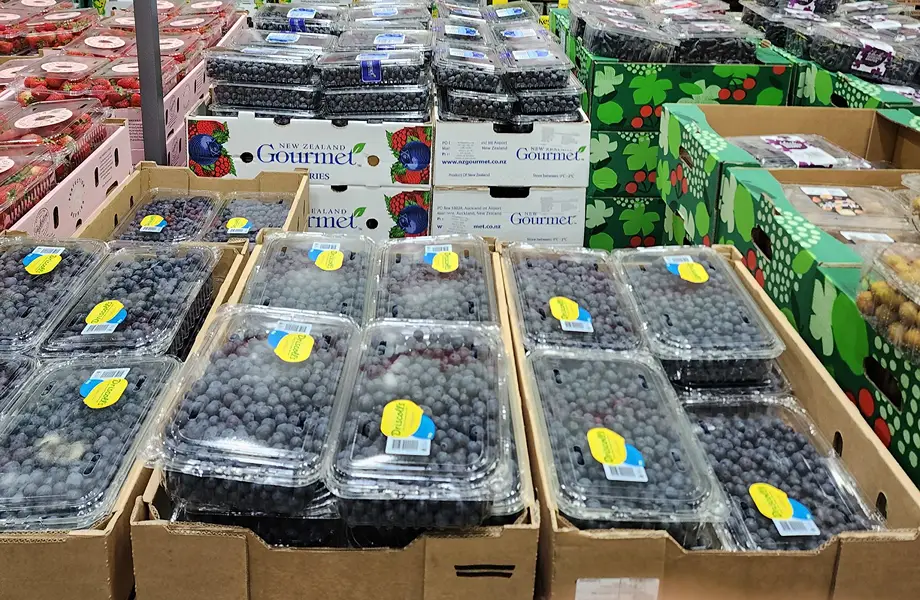Steve Taylor is Managing Director at Winterwood Farms Ltd, one of the leading growers and packers of blueberries in United Kingdom. In this exclusive interview to Italian Berry he talks about the current scenario of the blueberry industry in UK and how sustainable the local crop will be in the future.
How do you see the British blueberry crop developing during the next years?
As far as growing, I believe the UK has reached at or near its peak of hectares. The tonnes may go up for one or two years, cause they're mainly Northern Highbush, and the yields will increase. But, labour is short, due to Brexit, so there's not enough labour. The labour that is there is going up in price by 10% per annum while the UK consumer in general will not pay a massive premium for UK produced blueberries like they do with strawberries, for example.
So how do local blueberries compare to English strawberries in the consumers' perception?
We're all patriotic for our own countries. If you go back 10 years, blueberries weren't produced in the UK. So if you're a UK person, you don't associate blueberries with being British like you do for English apples or English strawberries. That's very emotive, and people will be very protective. But not really for blueberries.
You mentioned the challenges associated with labour shortage: how is that going to impact the blueberry industry?
Labour costs are going up. And the government has said that we are not having any more labour coming in. So we need to plan for less labour. Also automation robots are not here, machine harvesting is not here.
So as a British grower you're probably going to grow less because your competition in your main season is going to be Poland. Also Poland is short of labour, but not as short as the UK. And you can grow fruit, pick it, ship it to the UK for the same cost as you can just pick it in the UK. So it's not really sustainable at current volumes.
Can we put a figure towards the preference for local produce when it comes to blueberries?
I said there's not a big premium. There is a small premium for a few thousand tonnes, but once you get above, let's say, 3000 tonnes, and we're now at 6000 tonnes, the premium evaporates.
And if you're a grower and you ring retailer up and say "I've got an extra 200 tonnes", they'll probably say yes, but they probably also dictate their price. And it's very close to the cost of production.
So what's the position of a blueberry grower in UK nowadays?
You'll notice in Poland blueberry growers only grow blueberries. They don't grow raspberries, they don't grow strawberries, you know, in general. And there's a reason for that. And that's because the ground is a different requirement, whereas in the UK we've come from not growing blueberries to the retailers asking growers to grow blueberries. So that's generally the raspberry and strawberry growers, and their ground in general, very general, is not suitable.
Half of what's grown in the UK is in pots, so again more expenses. So, as a grower, I'd better put some plastic cover on it because I've spent a lot of money on a pot. And you got oil price’s going up, plastic’s going up, steel's gone up, although steel’s come down recently, and you add it all together...
Then we have to talk about sustainability: the carbon footprint is quite low. But the bottom line is that people in general attach more importance to price and quality that they do to the sustainability side.
So there's even a chance that the crop goes down in UK.
It won't in the short term because if… what the UK grower is doing is, when they're short of labour, they're deciding which, how they're gonna make do with the same amount of people or maybe 10% less people every year. So they will probably take blueberries.
They spent all that money on the tunnel, the plastic, the irrigation, the fertigation, the computer controls, everything, and they've got a pot in the ground that they're planning to have for 10 or 12 years, so they're not going to take that out if they have one bad year, they're probably not going to take it out if they have two or four bad years. It needs to really bite.
Also because for most of them blueberry is their secondary crop. They'll ride a bit of a loss, but I I think if you go forward, let's say 10 years, I don't think the UK is gonna be producing any more than it is now. The UK is well suited to producing something like strawberries, for example.
And the climate's good. We've got very good varieties, good breeding programmes, the demand's good. You get a premium for English strawberries.
I think that's because they are actually better! They really taste great.
I'm biased, but, well, I'm honest with you. I said blueberries, English blueberries. I don't believe there's a real point of difference in quality. And in fact, in some cases the imported fruit is better than the English because our climate is very well suited to raspberry, strawberries, blackberries. One could say it's less suited to some of the better varieties of blueberries.
What's the varietal profile in UK at the moment on blueberries? Mainly Duke?
There's a lot of Duke, but that's not necessarily because people think Duke's the best variety. It's because they're trying to pick everything before the Polish season starts so it's mostly about competition and price.








